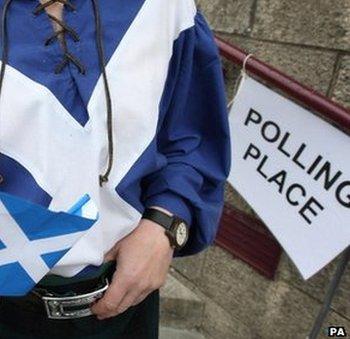Scottish independence: What are the legal steps to a referendum?
- Published

The legal authority to hold a referendum resides with the UK parliament at Westminster.
On Monday, the prime minister David Cameron and Scotland's first minister Alex Salmond signed an agreement which temporarily transfers that authority to the Scottish Parliament, using an order under Section 30 of the Scotland Act 1998.
The order will be debated in the House of Commons and House of Lords before going to the Privy Council for approval, which is likely to be given in February.
The transfer of powers includes all detail relating to the referendum.
MPs and peers will have no subsequent role in the process.
Rather, MSPs in the Scottish Parliament will debate the details of the poll - including the question, the timing and the franchise - in a Referendum Bill, which is expected to be introduced next spring.
Given that the Scottish National Party has a majority at Holyrood, it seems certain that the SNP policy of extending the vote to 16- and 17-year-olds will be approved.
The SNP's preferred timing for the poll, autumn 2014, is also likely to become law.
In the meantime, it is expected that the Scottish government will formally ask the Electoral Commission to "test" its proposed question.
The question which was outlined in the Scottish consultation on the referendum is: "Do you agree that Scotland should be an independent country?"
The testing by the Electoral Commission involves research with experts and with the public.
The process could take up to 12 weeks, after which the commission will submit a report to the Scottish government.
The recommendations are advisory, not binding, and ministers could theoretically choose to ignore them.
More likely they could accept the report, which might include tweaks to the the wording of the question, or they could suggest an alternative question.
The commission would then give its view on the alternative. If it had already considered that alternative during the initial testing period this could happen almost immediately, if not that process might have to begin anew.
Exactly how 16- and 17-year-olds would be enfranchised is complicated.
The challenge would be how to get them all on the electoral register in time for the poll.
The register is at present geared towards ensuring that all eligible voters are registered by the time they reach the voting age of 18.
Ordinarily the electoral roll is canvassed annually, although individual voters can register up to 11 working days before any poll.
Inconveniently, the 2014 canvas would have been held in the autumn, but changes being proposed in the Electoral Registration and Administration Bill presently being considered at Westminster would shift that year's canvas to April.
The age at which someone can first be listed on the register is complicated.
According to the Representation of the People Act 1983: "A person otherwise qualified is ... entitled to be registered in a register of parliamentary electors or local government electors if he will attain voting age before the end of the period of 12 months beginning with the 1st December next following the relevant date..."
In other words, not all 16- and 17-year-olds would be eligible under the present rules, which are reserved to Westminster.